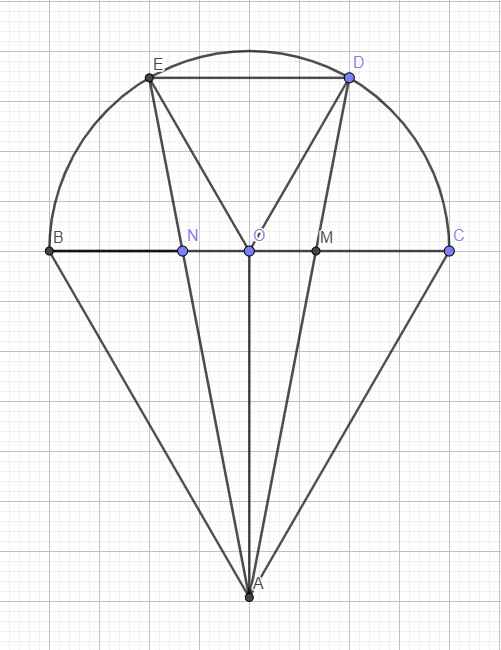
Hãy nhập câu hỏi của bạn vào đây, nếu là tài khoản VIP, bạn sẽ được ưu tiên trả lời.


Gọi O là tâm đường tròn \(\Rightarrow\) O là trung điểm BC
\(\stackrel\frown{BE}=\stackrel\frown{ED}=\stackrel\frown{DC}\Rightarrow\widehat{BOE}=\widehat{EOD}=\widehat{DOC}=\dfrac{180^0}{3}=60^0\)
Mà \(OD=OE=R\Rightarrow\Delta ODE\) đều
\(\Rightarrow ED=R\)
\(BN=NM=MC=\dfrac{2R}{3}\Rightarrow\dfrac{NM}{ED}=\dfrac{2}{3}\)
\(\stackrel\frown{BE}=\stackrel\frown{DC}\Rightarrow ED||BC\)
Áp dụng định lý talet:
\(\dfrac{AN}{AE}=\dfrac{MN}{ED}=\dfrac{2}{3}\Rightarrow\dfrac{EN}{AN}=\dfrac{1}{2}\)
\(\dfrac{ON}{BN}=\dfrac{OB-BN}{BN}=\dfrac{R-\dfrac{2R}{3}}{\dfrac{2R}{3}}=\dfrac{1}{2}\)
\(\Rightarrow\dfrac{EN}{AN}=\dfrac{ON}{BN}=\dfrac{1}{2}\) và \(\widehat{ENO}=\widehat{ANB}\) (đối đỉnh)
\(\Rightarrow\Delta ENO\sim ANB\left(c.g.c\right)\)
\(\Rightarrow\widehat{NBA}=\widehat{NOE}=60^0\)
Hoàn toàn tương tự, ta có \(\Delta MDO\sim\Delta MAC\Rightarrow\widehat{MCA}=\widehat{MOD}=60^0\)
\(\Rightarrow\Delta ABC\) đều




đây là bài lớp 10 chứ nhỉ
ta có \(AC=20\times2=40\text{ hải lí}\), \(AB=15\times2=30\text{ hải lí}\)
áp dụng định lý cosin ta có :
\(BC=\sqrt{AB^2+AC^2-2AB.AC\text{c}osA}=\sqrt{40^2+30^2-2\times30\times40\times cos60^o}\simeq36.06\text{ hải lí}\)



hình 1 : cho tam giác ABC vuông tại A, hạ đường cao AH, H thuộc BC
Xét tam giác ABC vuông tại A, đường AH
* Áp dụng hệ thức : \(AB^2=BH.BC\Rightarrow BH=y=\frac{AB^2}{BC}=\frac{225}{17}\)cm
=> \(CH=x=BC-y=17-\frac{225}{17}=\frac{64}{17}\)cm
* Áp dụng hệ thức : \(AC^2=c=CH.BC=\frac{64}{17}.17=64\Rightarrow AC=8\)cm
* Áp dụng hệ thức : \(AH.BC=AB.AC\Rightarrow AH=h=\frac{AB.AC}{BC}=\frac{15.8}{17}=\frac{120}{17}\)cm
tương tự hình 2 ; 3
làm ko làm nốt luôn đi
dùng đã bt rồi nhưng cần kết quả để so sánh sai ở đâu

a, Thay x = vào A ta được : \(A=\frac{3}{3-2}=3\)
b, Với \(x\ge0;x\ne4\)
\(B=\frac{3}{\sqrt{x}+2}+\frac{\sqrt{x}}{\sqrt{x}-2}-\frac{\sqrt{x}-10}{x-4}\)
\(=\frac{3\sqrt{x}-6+x+2\sqrt{x}-\sqrt{x}+10}{x-4}=\frac{4\sqrt{x}+4+x}{x-4}\)
\(=\frac{\left(\sqrt{x}+2\right)^2}{\left(\sqrt{x}+2\right)\left(\sqrt{x}-2\right)}=\frac{\sqrt{x}+2}{\sqrt{x}-2}\)(đpcm)




 ai giúp mình bài này với, mình cảm ơn nhiều
ai giúp mình bài này với, mình cảm ơn nhiều 
 Giải giúp mình với ạ, cần gấp lắm, cảm ơn
Giải giúp mình với ạ, cần gấp lắm, cảm ơn



a: \(P=\dfrac{2\sqrt{x}-9-x+9}{\left(\sqrt{x}-2\right)\left(\sqrt{x}-3\right)}+\dfrac{\left(2\sqrt{x}+1\right)\left(\sqrt{x}-2\right)}{\left(\sqrt{x}-3\right)\left(\sqrt{x}-2\right)}\)
\(=\dfrac{-x+2\sqrt{x}+2x-4\sqrt{x}+\sqrt{x}-2}{\left(\sqrt{x}-3\right)\left(\sqrt{x}-2\right)}\)
\(=\dfrac{x-\sqrt{x}-2}{\left(\sqrt{x}-3\right)\left(\sqrt{x}-2\right)}=\dfrac{\sqrt{x}+1}{\sqrt{x}-3}\)
b: Để P<1 thì P-1<0
\(\Leftrightarrow\dfrac{\sqrt{x}+1-\sqrt{x}+3}{\sqrt{x}-3}< 0\)
\(\Leftrightarrow\sqrt{x}-3< 0\)
hay x<9
Kết hợp ĐKXĐ, ta được: 0<=x<9 và x<>4
c: Để P<1 thì 0<=x<9 và x<>4
mà x là số nguyên
nên \(x\in\left\{0;1;2;3;5;6;7;8\right\}\)